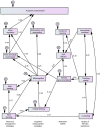Relationships between the quality of blended learning experience, self-regulated learning, and academic achievement of medical students: a path analysis
- PMID: 25610011
- PMCID: PMC4293215
- DOI: 10.2147/AMEP.S75830
Relationships between the quality of blended learning experience, self-regulated learning, and academic achievement of medical students: a path analysis
Abstract
Purpose: This study examined the relationships between the different aspects of students' course experience, self-regulated learning, and academic achievement of medical students in a blended learning curriculum.
Methods: Perceptions of medical students (n=171) from the Royal College of Surgeons in Ireland, Medical University of Bahrain (RCSI Bahrain), on the blended learning experience were measured using the Student Course Experience Questionnaire (SCEQ), with an added e-Learning scale. In addition, self-regulated learning was measured using the Motivated Strategies for Learning Questionnaire (MSLQ). Academic achievement was measured by the scores of the students at the end of the course. A path analysis was created to test the relationships between the different study variables.
Results: Path analysis indicated that the perceived quality of the face-to-face component of the blended experience directly affected the motivation of students. The SCEQ scale "quality of teaching" directly affected two aspects of motivation: control of learning and intrinsic goal orientation. Furthermore, appropriate course workload directly affected the self-efficacy of students. Moreover, the e-Learning scale directly affected students' peer learning and critical thinking but indirectly affected metacognitive regulation. The resource management regulation strategies, time and study environment, and effort regulation directly affected students' examination scores (17% of the variance explained). However, there were no significant direct relationships between the SCEQ scales and cognitive learning strategies or examination scores.
Conclusion: The results of this study will have important implications for designing blended learning courses in medical schools.
Keywords: examination scores; structural equation modeling; student course experience.
Figures

References
-
- Pintrich PR. A conceptual framework for assessing motivation and self-regulated learning in college students. Educ Psychol Rev. 2004;16(4):385–407.
-
- Duncan TG, McKeachie WJ. The making of the Motivated Strategies for Learning Questionnaire. Educ Psychol. 2005;40(2):117–128.
-
- Greene JA, Azevedo R. A macro-level analysis of SRL processes and their relations to the acquisition of a sophisticated mental model of a complex system. Contemp Educ Psychol. 2009;34(1):18–29.
-
- Cho M, Shen D. Self-regulation in online learning. Distance Education. 2013;34(3):290–301.
-
- Lim DH, Morris ML. Learner and instructional factors influencing learning outcomes within a blended learning environment. Educational Technology and Society. 2009;12(4):282–293.
LinkOut - more resources
Full Text Sources

